Introvert DefinitionAn introvert is someone who exhibits traits associated with the introverted personality type, meaning they prefer to pay attention to their own inner thoughts and ideas as opposed to what is occurring around them. Instead of being among vast crowds or groups of people, they prefer to spend time with only one or two people or by themselves. 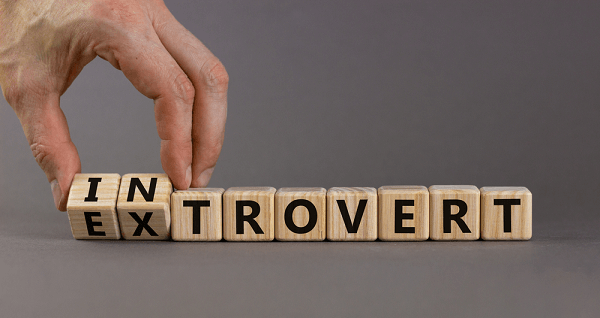
You might picture a shy, quiet person who wants to be alone when you hear the word "introvert." While that may be the case for some introverts, there is much more to this personality type. The way you interpret the environment around you will determine whether you are an introvert or an extrovert. Introvert DefinitionAn introvert person often prefers quiet, low-stimulation surroundings. After socializing, introverts frequently feel exhausted and find that alone time helps them feel more energized. This results in part from the fact that introverts' brains react to dopamine differently than extroverts. Types of IntrovertsThere is no black-and-white way to define your personality if you're an introvert. Introverts are thought to be somewhere along a spectrum by psychologists. The level of Introversion varies among individuals. The center of the scale is where other individuals land. They're referred to as ambiverts. 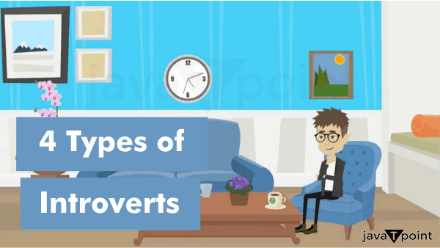
The majority of introverts also exhibit some extroverted characteristics, and the opposite is true for extroverts. You might be an introvert in a variety of ways. According to one study, there are four categories of introverts that they often come under: 1. Socially IntrovertedAlthough they may not be inherently shy, people of this kind choose solitude or brief social contact over more elaborate ones. Smaller gatherings and peaceful environments are more appealing to social introverts than crowds. They prefer small-scale events to large-scale ones or private coffee dates over family breakfasts. 2. Thinking IntrovertsThinkers are introverts who spend a lot of time in their heads and have creative imaginations. They are frequently referred to as daydreamers. They like speculating, making things, coming up with ideas, and telling stories so much that it takes up much mental room, unintentionally making other people less important. As a result of their high introspectiveness, they may come out as distant when they're actually simply analyzing the issue, and since they take their time responding, they frequently get misinterpreted for being inactive. Using their alone time to focus on and internalize their thoughts, thinking introverts reenergize themselves. 3. Anxious IntrovertsSince they frequently experience social awkwardness or shyness, anxious introverts seek for alone time. In public settings and even when they are alone themselves, they may feel really uneasy. A characteristic of nervous introverts is the reserve. It is probable that they will stay away from situations and individuals that make them feel anxious. The entire thing is merely their protective defensive system at work, despite the fact that it could come off as avoidant or nasty. Though they are well conscious of their comfort zones and dislike having their borders and bubbles broken, this does not imply that they dislike the company. 4. Restrained IntrovertsSince they are unlikely to make a choice on the spur of the moment, these introverts tend to take longer to make decisions and take action. Restrained introverts wait to reveal all their cards immediately since they are typically quite wary initially. They become realistic and grounded in their outlook on life as a result. However, they are eager to play once you get to know them. They also like routine occupations and have little trouble separating themselves from their feelings. The degree to which you are introverted may fluctuate over time and in various contexts. No matter which archetypes you relate to, remember that being an introvert has a lot going for it when it comes to connecting with people, whether via your ideas, sensitivity, finely tuned ideas or party planning skills. Personality Traits of an IntrovertThe distinctive qualities that make you who various variables shape you, and these same things may also impact how Introversion manifests itself in your personality. Another way to phrase it is that no two introverts are precisely the same. 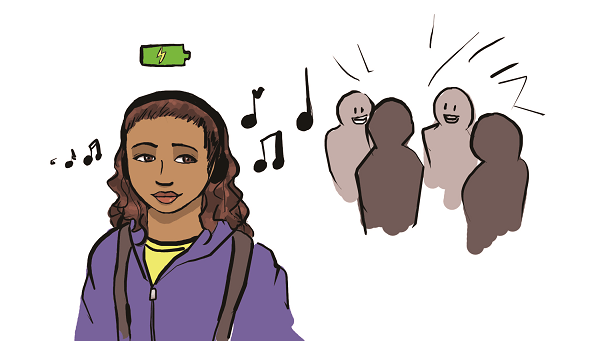
Having said that, you can identify Introversion in yourself by some of the following characteristics and actions. 1. You Need Plenty of Time for YourselfDo you believe that time spent alone is necessary for good health and well-being? Whether you want to spend the evening relaxing or engaging in a peaceful activity by yourself, you may find the notion of a quiet night at home really pleasant. You're more introverted than extroverted if spending time alone brings you emotions of relaxation and tranquility rather than dissatisfaction. 2. It Tires You to Socialize Too MuchContrary to popular belief, introverts do not detest or shun social situations altogether. Nevertheless, compared to someone more outgoing, you could discover that you require more downtime between occasions. Your energies may be exhausted from Friday's socializing with friends, making Saturday the perfect day for you to relax and replenish in isolation. 3. You Have a Hard Time with ConflictEven routine conversations may be exhausting sometimes, but what about circumstances where there could be a conflict? According to some research, introverts are more likely to be sensitive to criticism and negative feedback. It might be difficult for you to express yourself when you think that someone could disagree with you or not like what you have to say. 4. You Perform Better on Your OwnAnyone who hears the words "group project" would shudder at the thought, but you might be more of an introvert if you find working in groups particularly repulsive. Working at your own speed allows you to concentrate on the subject at hand without dealing with the dynamics of a group or tuning out the talk. It also provides you time to think through your strategy. Of course, this doesn't automatically imply that you have a hard time getting along with people. Working alone makes it simpler for you to focus. That also holds true for your interests; introverted individuals frequently choose solitary pursuits like reading, crafts, gaming, or gardening. 5. The Spotlight Does Not Tempt YouYou could enjoy working in smaller teams, yet you consistently select administrative positions. That may imply that you volunteer for jobs that keep you away from the audience or that you prefer to conduct the research and write the report rather than present it. You prefer to linger on the periphery, where you may avoid being seen rather than becoming the focus of attention. 6. You Prefer to Have a Small Group Of Close FriendsIt's common for introverts to only have a small group of friends, but this isn't because they are socially awkward or don't like people. In fact, research from a reliable source reveal that the quality of their interactions greatly influences happiness for introverts. If you're an introvert, you might prefer to have a small group of close friends rather than a huge group of random acquaintances. You require more alone time than an extroverted person may, so you have less time to socialize and keep up with a crowd. Myths About Introverts
1. All Introverts are ShyHowever, being "introverted" and "shy" are different. Though being shy and being an introvert are two distinct traits, people sometimes assume that introverts are all shy. According to specialists, although shy people may experience awkwardness or anxiety during social encounters, introverts have the personality attribute of drawing their energy from their own thoughts rather than from other people or the outside environment. When you first meet an introvert, they could come across as "shy" and not be very talkative since they prefer to think before they speak. Give introverts some time to warm up; once they do, you'll discover they have a lot to say. As excellent conversationalists, introverts excel at listening and responding to what others have to say, which is one of their many positive traits. Introverts don't enter a discussion only to hear themselves talk; rather, they sincerely hope to connect with the other person, get insight from them, and discuss important issues such as life lessons and how to overcome heartbreak. 2. Introverts are EmotionlessPeople that are introverted are not machines. They might not publicly show their emotions in a dramatic way, yet they nonetheless experience emotions and sentiments just like everyone else. The difference is that they tend to internalize their emotions and reserve them until they are by themselves and can deal with them on their own. An introvert will not likely become unduly emotional in response to another person's feelings but rather maintain composure. Introverts frequently assist others in de-escalating their behavior and emotions and prevent tense situations from growing worse. There are moments when you need someone who can maintain composure under pressure, and introverts are the best at doing so. Many introverts can make the right choices and act appropriately, all while maintaining their composure and offering others emotional support. 3. Introverts are LonersAlthough introverts prefer their privacy, that doesn't imply they can't tolerate any form of social engagement. While they may not need regular interaction, introverts value meaningful interactions, close friendships, and just hanging out with others. Introverts are neither hermits nor recluses, despite what some people may believe, and they do not need to live alone. All they really need is some peace and quiet to unwind, so they can gather their thoughts and refuel. On the other side, loner persons have a tendency to shun social interaction and may even reject it outright when it happens. Despite the fact that introverts may need some alone time, they still need to interact with other people. I share a home with my partner, but when I need some alone time, I go to my "introvert sanctuary"?a tranquil place just for me?to read a book for a bit or spend time with my kitties. I'll gladly accompany my guy to dinner or a movie once I've had a chance to recharge, though. 4. Introverts Do not like SocializingWhile it's unlikely that an introvert would close down the bar or be the last person to leave a party, they still love hanging out, interacting, and speaking with others in moderation. They might indeed feel uncomfortable with strangers and generally won't be a party-hopper who attends many parties at once. In spite of this, they don't ethically oppose social activities, parties, or gatherings. If Introverts are in the appropriate frame of mind, there are few people around, and it's not a noisy or uncomfortable setting, introverts may be social. We still go to larger gatherings, even if we prefer private ones. Furthermore, Introverts tend to stick with their tiny inner circle of friends who "get" us during such events rather than mingling with strangers in search of new acquaintances. A movie, a nice book, or spending time at home with their dog or cat?what would an introvert favor? Maybe. (Well, typically, sure.) It doesn't follow, though, that they don't occasionally take pleasure in engaging with others. Advantages and Disadvantages of IntrovertsThere are several benefits to taking into account when it comes to being an introvert. However, there are a few drawbacks as well, which you should also be aware of. A person who is timid and somewhat reluctant is known as an introvert. While it may seem that this attitude would highlight the drawbacks, the reality is far more nuanced than that. As you'll shortly discover, there are a range of introvert benefits and drawbacks to consider. 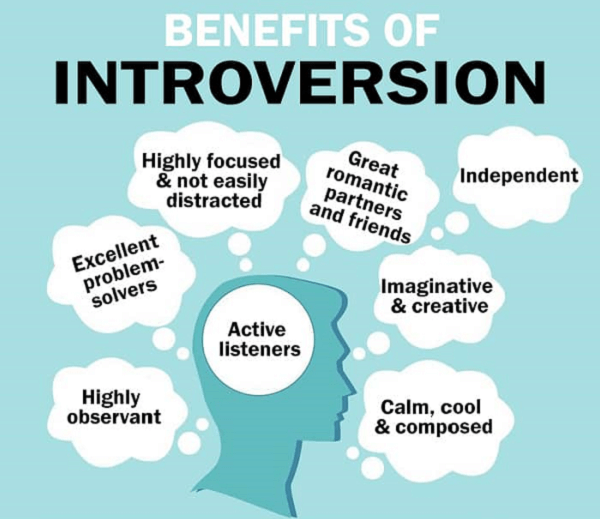
Advantages Of IntrovertsBeing an introvert can have a number of benefits that many people may not truly be aware of: 1. Introverts Choose their Words WiselyWorking with an introvert has several benefits, one of which is that even if they don't speak out all that frequently when they do, their comments carry a lot of weight. This is due to the fact that an introvert will likely select their words carefully. 2. FocusA lot of unconscious concentration must be pulled in order to maintain an introverted disposition. This focus may be advantageous in a number of ways. 3. Fast LearnersThere is a substantial body of research that supports the idea that introverts assimilate information at a faster rate than anybody else. 4. They're Usually QuiteThe quiet personality that many introverts possess can offer a lot of benefits. This is especially true when it comes to how great of renters introverts are for landlords who don't want someone they might have to worry about. 5. Introverts Are Good ListenersIt is true that the "silent ones" have a tendency to pay attention to and take into account the opinions and feelings of others. Instead of just waiting for their turn to speak, they can make mental notes and pay great attention to what the other person is trying to communicate. 6. Introverts Develop Close Ties with OthersThey place a higher priority on quality encounters than quantity. Although many of them will be casual in nature, extroverts are more likely to have a large number of personal relationships since they regard almost everyone as a "friend." Due to their limited social energy, introverts are more selective about who they let into their surroundings, ensuring that the relationships they do forge are appreciated and nurtured. 7. Introverts Are More Independent and Require Less SupervisionExtroverts often stress teamwork and cooperation, which is a common attitude in today's business and classroom. Being more private, introverts are more prone to pursue a lifestyle that prioritizes independence and self-sufficiency. As a result of their preference for working alone whenever possible, they require less Supervision and "check ins" than extroverted workers or students do. They normally don't get distracted or diverted by socializing. Therefore, managers may count on them to finish a task without doing so. The dependence on others is something that many introverts detest, and they feel more empowered when they are able to handle challenges entirely on their own. Disadvantages of IntrovertsDo introverts have any drawbacks? Absolutely. You'll want to bear in mind the following items: 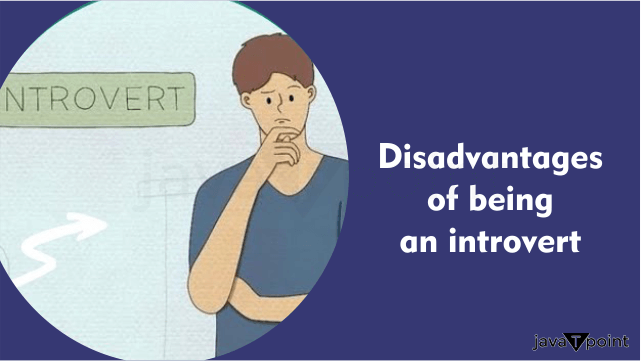
1. Social CulturesThe majority of the time, introverts do not want to be unpleasant, but there are some aspects of their conduct that might irritate some individuals. The main reason for this is that being an introvert frequently entails forgoing particular social norms. 2. Bad First PerceptionAs was previously noted, some aspects of an introvert's conduct might irritate someone. During introductions, this may be especially true. 3. Verbal CommunicationSpeaking in public can be incredibly challenging for certain introverts. The communication problems may worsen if they start to feel anxious. 4. No NetworkingThe ability to network exists for introverts. Even those with strong personalities can succeed in it. On the other hand, a lot of introverts find networking challenging and unpleasant. Many people opt to avoid it entirely due to the possible stress. 5. Speaking in Front of Crowds May Be AgonizingThey are shy in various situations. They hate public speaking because of their fear of it. On the other side, public speaking hurts like hell. Introverts may be at a disadvantage because many circumstances call for public speaking. 6. People Want To "Fix You"Many people, particularly extroverts, think that introverts are abnormal and want to "cure" them by getting them to come out of their shells. Check out this recent news. Having an introverted personality is perfectly normal. Contrary to popular belief, introverts are not flawed people; they are simply different from extroverts. The only thing that needs to change is how much time people spend getting to know and comprehend introverts. They will respond if you give them the freedom to be themselves. What Causes Introversion?Like other facets of personality, Introversion emerges as a result of a confluence of two major factors: genes and environment. Your genetic makeup, or the characteristics you acquired from your parents, greatly influences where you lie on the personality spectrum. 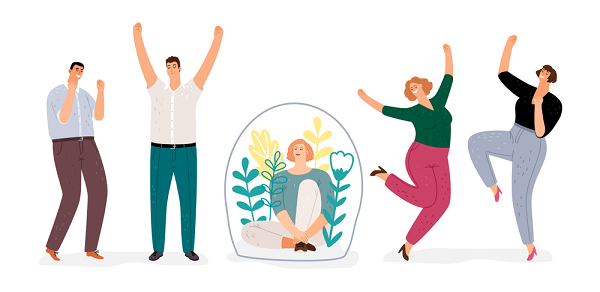
Someone born into an introverted household will also go on to have an introverted personality. However, this is only partially due to the genes that affect personality. Your upbringing and surroundings play a significant role. Paying attention to how your family members act and react in social situations may help mold your personality. Other contextual determinants include your parenting style, the sort of schooling you receive, your interactions with classmates, and your life events, particularly during your formative years. Power of IntroversionPeople frequently misunderstand introverts. They are viewed as timid, distant, or uninterested. However, introverts possess a quiet strength that allows them to concentrate intently on the most important issues. You may make the most of your introverted traits if you want to enjoy them. The power of the introvert. This is because they consider each word thoroughly before uttering it. Their work or their relationships are not governed by the language they use. In addition to being excellent listeners, they are also outstanding observers. An introvert has the ability to see aspects of a person that the average person cannot. Introverts are able to discern more than what the naked eye can reveal about a person based on their behaviors and body language. This aids in their development as individuals, increased awareness of their environment and the people within it, and strategic success. ConclusionTo sum up, introverts are just regular individuals who want extra time and space in solitude for reflection and analysis. Although they are able to converse, they feel more comfortable in their own environment with individuals they know and trust.
Next TopicLoan- Definition
|
 For Videos Join Our Youtube Channel: Join Now
For Videos Join Our Youtube Channel: Join Now
Feedback
- Send your Feedback to [email protected]
Help Others, Please Share










